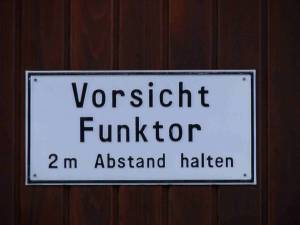On category theory basics
| Foundational temp1b $\blacktriangleright$ On category theory basics $\blacktriangleright$ On universal morphisms |
Guide
From every category, we can obtain another one by simply flipping the arguments of concatenation.
As far as objects $A,B\in{\bf C}$ are concerned, functors $F$ in ${\bf C}\longrightarrow{\bf D}$ are plain functions, acting via $A\mapsto FA$. For this reason, people sometimes only think of object map when thinking about certain functors, but it's generally very important to remember the arrow map, which in a sense is much finer. Note that the functors object map implicitly also maps the hom-classes “${\bf C}[A,B]\mapsto{\bf C}[FA,FB]$”. Now while $F$ doesn't care for any “internal” details of the objects (e.g. the elements, in case the objects are sets), it does indeed care for the terms of the hom-classes!
As opposed to functors defined above, natural transformations indeed look at the “internal” details objects.
